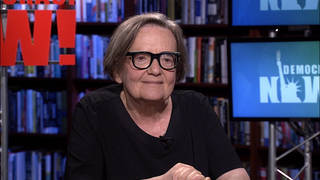
Guests
- Gabriela AndreevskaMacedonian activist and one of key organizers who has been working on the ground for the last four months to provide food, transportation and medicine to refugees crossing the Macedonian-Greek border. Her advocacy has also helped get people safe passage in trains, when before they simply were walking across country. Andreevska is a member of the leftist movement, Solidarity.
On Monday, a single-day record 7,000 Syrian refugees arrived in the former Yugoslav republic of Macedonia. We go to the Macedonian-Greek border to speak with Gabriela Andreevska, one of key organizers who has been working on the ground for the last four months to provide food, transportation and medicine to refugees crossing the border.
Transcript
AMY GOODMAN: I wanted to end by going to Macedonia, one of the places you talked about, Zaher. We’re joined on the telephone right now by Gabriela Andreevska, a Macedonian activist, one of the key organizers who has been working on the ground for the last four months to provide food and transportation and medicine to refugees like you who are crossing the Macedonia-Greece border. In this last minute we have on this broadcast, if you could tell us what the situation is there, Gabriela, and what needs to be done?
GABRIELA ANDREEVSKA: So, currently, the refugee camp location has been relocated to a place outside of the border town. So when the refugees cross the border, they have [inaudible] across the Greek-Macedonian border and continue on toward the EU. So when they do that and when they go to the camp location, things are much more organized. So, organization-wise, things have improved. But the refugees still are obligated to cross borders illegally, so we must work on providing more safe transport to them.
AMY GOODMAN: And your biggest challenges?
GABRIELA ANDREEVSKA: I would say that’s the biggest challenge. Why are people fleeing wars obligated to walk hundreds of kilometers on foot to cross borders illegally?
AMY GOODMAN: What do you want Macedonia, the European Union—how do you want countries around the world to respond right now?
GABRIELA ANDREEVSKA: Protect people, not borders—that’s how I would like them to respond. If people need safe passage, who are we protecting our borders from? From people fleeing wars.
AMY GOODMAN: Gabriela Andreevska, I want to thank you for being with us, from Macedonia; Erik Leidal from Austria with Train of Hope; and Zaher Majzoub, for describing this harrowing journey you took from Syria. I want to thank our guests today in our studio here in New York. Sarab Al-Jijakli, who is a Syrian-American community organizer; they’ll be having a major protest in New York on Saturday. And thank you to Philippe Legrain, who joined us from London.












Media Options